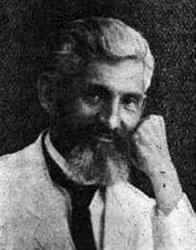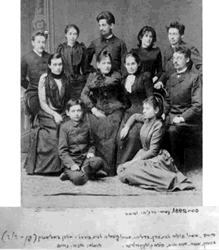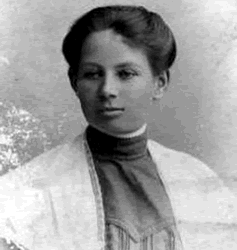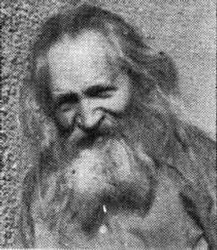
Manya Shochat née Wilbushewich / Wilbuszewicz
Manya Shochat (or Mania Shohat), née Wilbushewich / Wilbuszewicz,
(1880 – 1961) was Russian Jewish politician and the "mother" of the
collective settlement in Palestine, the forerunner of the kibbutz
movement.
Biography
Russia and early days in Palestine
Manya was born in Russian Poland (today Belarus) to middle-class
Russian Jewish parents, and grew up on the family estate of "?oso?na".
One brother, Isaac, studied agriculture in Russia. He was expelled for
slapping a professor who, in the course of a lecture, stated that the
zhids (a derogatory term for Jews) were sucking the blood of the
farmers in Ukraine. In late 1882, he left for Palestine and joined the
Bilu movement. His letters home were a powerful influence on young
Manya. Another brother, the engineer Gedaliah, went there in 1892, and
helped fund his younger siblings' education. As a young adult, she
went to work in her brother's factory in Minsk to learn about working
class conditions. She was imprisoned because of her contacts with Bund
revolutionaries in 1899. There she was indoctrinated by Sergey
Zubatov, the head of the Tsarist Secret Police in Moscow. Zubatov
conceived a plan that fit with Shochat's ideological notions, through
which workers would form "tame" organizations that would work for
reform rather than for overthrow of the government. She was persuaded
that this would also help achieve rights for Jews. She founded the
Jewish Independent Labor Party. The party was successful in leading
strikes because the secret police supported it, but was loathed by the
Bund and other Jewish socialist groups. The party collapsed in 1903
following the Kishinev pogrom. Experiencing, as she put it, 'severe
emotional distress' following the loss and failure of her political
organization and path, she accepted an invitation from her brother
Nachum, who was the founder of the Shemen soap factory, to accompany
him on a research expedition to some of the wilder places of
Palestine. She arrived on January 2, 1904. "I couldn't see what
direction I should take in my life. I agreed to join my brother's
expedition, because, in fact, I was indifferent to everything. For me
it was just another adventure." Manya fell in love with the beauty of
the land and was especially touched by the plight of the Jewish
settlement in the Hauran. "The Hauran remained without a redeemer -
and my soul cleaved unto this place." The Baron Rothschild had bought
land in the area, but the Ottoman government stipulated that no Jews
be allowed to settle there. A small group which had disregard the
decision was evicted, so the Baron resorted to leasing out the plots
of land to Arab Fellahin. Manya decided to visit all of the Baron's
colonies and see for herself why they were in financial straits. She
became acquainted with and greatly impressed by Yehoshua and Olga
Hankin. Her decision to stay was due in a large part to their
influence.
In Palestine
As a result of her first visit, Manya reached a conclusion which
anticipated that of Arthur Ruppin. She understood that the model of
plantation settlement, favored by the Baron Rothschild, where Jewish
owners employed Arab workers and were subject to economic overseers,
could never be the basis for Jewish national life. It led to financial
difficulties and disaffection. She concluded that only collective
agricultural settlement could produce Jewish workers and farmers who
would be the basis for building a Jewish homeland. Her first priority
was finding a solution for the problem in Hauran.
Manya left for Paris, in order to research the feasibility of her
ideas and then to convince the Baron to back them. In 1905, a fresh
wave of pogroms swept the Russian Empire. Meir Cohen, an old friend
from Minsk, came to Paris seeking the aid of the Jewish community to
buy arms so they could defend themselves. Manya laid aside the Hauran
project, and put her efforts towards fundraising. She convinced
Rothschild to donate 50000 gold francs to that end.
Guns and ammunition were bought in Liege and smuggled into Russia. In
order to deliver the final consignment, Manya disguised herself as a
young rabbanit from Frankfurt, bringing eight cases of scriptures, a
gift for the yeshivot of Ukraine. In Odessa, an undercover police
agent gained access to her apartment and discovered where the guns
were. Manya, who had a silenced pistol, shot him before he could get
out and report his findings. The guns were successfully delivered to
the Jewish underground. Not one was lost.
She returned to Palestine in 1906 to further pursue her Hauran plan.
Towards the end of the year, she travelled to the United States to
raise funds for that and for arms for Russian Jews. The idea of
collective settlements in general, and the Hauran scheme in
particular, received no support. She realised that the only way to
convince people that it could work was by putting it into practice, so
she returned to Palestine in 1907.
Manya shared her idea with enthusiastic members of "Poalei Tzion" and
"Hapoel Hatzair". Hankin convinced Eliahu Krauzeh, the director of the
Sejera farm, to give them stewardship over it for a year. It had been
one of the least successful farming plots around. Krauzeh was
reluctant, because the group's radicalism could cost him his job.
18 young men and women, mainly friends of Israel Shochat, established
there the land’s first ideologically based cooperative which inspired
later settlement at Degania. The project succeeded and lent credence
to the idea of collectives. In 1908, with Israel Shochat, she helped
found the HaShomer, a guard organization, which evolved into the basis
of Jewish self-defense. Its goal was to put the responsibility of
guarding settlements in Jewish hands.
She married Israel Shochat and had two children with him. In World War
I, the Turks deported the Shochats and others who were Russian
nationals to Bursa, in Turkey. They returned around Passover, 1919,
after attending the Poalei Tziyon convention in Stockholm.
In 1921 she was in Tel-Aviv when riots broke out among the Arabs, who
then attacked Jewish settlements. Along with other Hashomer members,
she took part in the defence of the city. At great risk, she would
walk around, disguised as a Red Cross nurse, to keep an eye out on
developments. Her experience in Russia came in handy as they attempted
to smuggle in grenades for the defenders of Petah-Tikva. She hid them
among baskets of vegetables and eggs. The car they were in got mired
just outside of the town. A patrol of Indian cavalry approached. Their
role was to search all travellers for arms. With great presence of
mind, Manya averted disaster. She ran up to the patrol, begging them
to help rescue the car from the mud. While they were pulling it out,
she watched the baskets, saying that she didn't want the eggs to
break. The cavalry then even provided an escort until they got into
town.
After the riots were over, she travelled the United States to raise
funds for the defence efforts. Due to a series of misunderstandings
between her and Pinhas Rutenberg, the transfer of funds was frozen and
the two didn't speak for years.
She was active in the Gdud HaAvoda and clandestine immigration, as
well as arms-smuggling. In 1930, Manya Shochat was among the founders
of the League for Arab-Jewish Friendship. In 1948 she joined the Mapam
party. Family
She married Israel Shochat, who was 9 years younger. She had 2
children with him: Gideon (Geda) and 'Ana. Gideon Schochat was a pilot
in the British Royal Air Force (RAF) during World War II and later
became one of the founding pilots of the Israeli Air Force, rising to
the rank of Colonel. He committed suicide in 1967. In 1971, his
daughter Alona married Arik Einstein, a famous Israeli performer. They
had 2 daughters together. They later divorced, the daughters remaining
with their mother. They later became Orthodox Jews, and the daughters
married Uri Zohar's sons. Zohar was a good friend of Einstein and
became one of the leading figures in the Orthodox community.
Gdalyahu Wilbushevitz
Born 1865 in the estate Losossna. Near Grodno. His father was wolf
Vilboshevitz (a well to do owner of estates and mills, the first to
introduce new machines in this county. Scholar and a religious feeling
developed, students and associates of R. famous Nhumtz'h Most
justifications. nephew of Rabbi Samuel Joseph Finn Vilna heads Lovers
of Zion, editor of "Carmel" and author of 'treasure. "in-law of Dr.
Joseph Hazanovitch Bialystok father of the idea and practice of Basic
House - National Library in Jerusalem called the first" true home "
and "gnzi Joseph "in his name) and his mother, Sarah, daughter of
Moses Rosenzweig (born in Kamenets - Podolsk, educated, well-versed in
European languages and literature, feisty and aggressive nature,
superstition especially educating her sons and daughters in the spirit
of the Enlightenment).
Learn first in the cheder and then at - Bialystok real school spirit
and love of Zion educated active in-law Dr. Hazanovitch. Under the
influence of Dr. Mintz was active in immigration to Israel - Israel by
powerful program - Scope (unfulfilled) of the English Zionist Sir
Laurence Oliphant. During 1884/88 attended - the High Technical School
in Berlin Sharlotnborg and certified engineer - machinery. Was active
in " Sons of Moses "and the Lovers of Zion movement.
Btrn"b married Zila bat Shraga Bordeaux. Grodno, and soon after his
marriage came to Israel with his wife. Zila was ill with malaria and
forced to leave the country. Was the first engineers to qualified Jews
in Israel. Participated in a engineer Leon Stein essentially managed
by the Bithhrosht machinery and casting to. Stein Jaffa, Jewish
enterprise first profession in the country. prepared the equipment
first drilling wells along with Stein, drilled well Artizianit first
streets and managed the building the first houses, dug the well, the
first modern Petah Tikva and put it to pump the mechanical (the first
colony), the index of the first the land of her room, worked out a
plan preserves soil irrigation in the Jordan river Jordan.
When hope was not fulfilled for his wife recovery must alsoIs out of
the country, in 1894 he returned to Russia, established in Minsk
together with the. Salkind technical office and home - factory
machines, employing 200 Jewish workers (a rare thing in Russia), who
specialized in his profession, and thus open to Jews entering the work
Bmichanika. In 1900 he established a - Bnovovurisob paper factory.
Founded in 1903 with Yehuda Zev touch and his brother Nahum Minsk
"Land of Israel Industries Development Corporation." And participated
in the foundation of a "future" in Haifa in 1906.
Meanwhile, continued to engage in Zionist activity with D'' Dr. Isaac
garnet, Moshe Chaim Hurgin and engineer in Israel Cassel, and -1907
participated as a delegate to the Zionist Congress (in the meantime
immigrated sister, stock Vilboshevitz - Shochat, and developed
activities multi March orderly plans of settlement work on the
foundations collective and organized Hebrew preservation organization
in Eretz Yisrael).
In 1908 he visited Israel to Bithhrosht to business recovery. Stein
Jaffa and returned to Russia. In 1910/12 came up concrete plans for
the industrial country - Israel and served in this regard offers the
Tenth Zionist Congress (Basel 1911) and together with his brother
Moses worked for the foundation consortium of owners - Capital Zionist
Russia (Pollack, squat, Wissotzky, and Adiaib and Persitz) to
establish - Israel and oil industries, cement and paper mills and
large (on the viability of these ideas evident by the fact that almost
all of them have been fulfilled).
In 1912 came to settle in the country and was appointed to manage the
building works Htcnion and - Reali School in Haifa.
The outbreak of war - the First World Av Tra"d appointed on behalf of
the American aid performance management committee chairman public
works in Tel Aviv in order to lessen the crisis.
September Tra"o was appointed by the Turkish military government to
manage public affairs work in Jaffa and in particular to improve the
city and the opening of a new street planted with palm groves outside
the city to expand. - These are avenues then called the name of the
commander Jamal Pasha, and then the
Where King George the fifth. At the end of the tribe Tra"o by Jamal
Pasha was appointed chief engineer at the top headquarters in Damascus
and afterwards in Damascus Municipality engineer and worked to improve
the city, luxurious Avenue School, examined ancient mosques,
buildings, roads, etc.. This time, many Jews employed work and
released them that the service in the army.
In 1919/21 he was director of the technical department of the
commission solicited Mr. Faeinson found in oil factory, built the
house - oil factory "Agolin" Alexandria of Egypt and conducted the
first phase of building a house - the Great Synagogue in Tel - Aviv.
Since 1922 he sat in Haifa and worked as an engineer, builder and
later a consultant engineer. Built the buildings houses - factories
"fat", "eagle" and Electric Company and the start of the main
synagogue in Haifa, not for a reward.
Since 1932 member of the Executive Committee of Htcnion, initiator and
manager rates - professional evening at Htcnion, a member of the
Assembly of Representatives and various scientific congresses axis.
Created a generation of many students to the profession and many
workers guided the work of the building.
Two goals made a sketch of him in public life: a) a war for the
development of industry and the horse, and against the reduction in
agricultural settlement (initial proposals suggested in this regard
even in 1894 the Odessa Committee of Lovers of Zion).
B) creating a class of owners - Jewish professionals imbued with love
for the profession and work, the first condition for the success of
industrial settlement.
Was a work and vision, a member of the Histadrut, lived a life of
austerity and humility, but firm in his opinions and demands for
maintaining the quality of work and level of the profession, and who
acquired Nadav Public Institutions.
Lists published memoirs and papers periods Aotobeografih "Dar Today",
"Talk", "world" and "omr. "
He died in Haifa, Elul Ts"g Tuesday (09/04/43).
The fortune left the national camp on Mount Carmel in the name of his
mother "Sarah Vilboshevitz" and the Foundation awards by Htcnion
Hebrew the name "Shadow and Gedaliah Wilboshvitz" for research
projects in terms of the building.
Descendants: Emmanuel (PhD in economics and a machine shop in Haifa),
Alexander (served with the first Hebrew First World War and was one of
the organizers. Died in 1932
--
Moses Vilboshevitz
Born in the village Losossna, near Grodno (Belarus), agreed on May 1
(as explained below) of 1869 (Trc"t), his father Wolf (nephew of Rashi
Pin Vilna, Laird and Mills) and his mother, Sarah, daughter of Moses
Rosenzweig. (Additional information on the parents and the other
descendants of Rabbi - verbs, see the special values ??of the names of
some of them, and in short all centered on the fireplace in Nahum,
Volume II, page 950 ). Studied Judaism and continued teaching private
home thoroughly and practice in various sectors of the technique and
chemistry, and then dealt with successfully engineer better. Built in
Russia factories and mills and large've liked the owners and workers
alike. (Be a celebration of May 1, is prohibited in Czarist Russia,
Set the day - the birth that date, according to the Julian calendar,
and the hand, inviting the 1500 workers in the mills a big celebration
for her birthday and against the party "private" that found no
authorities no complaints. since remained date his birthday
agreements, rather than the date true that there was a remembrance ).
devoted Investigation Himi oil industry and popular input and waste
utilization. invented many important inventions
(Firming foundation to create margarine, oils, etc.), and got them a
hundred patents. And to find theoretical results permit attempts began
at the age of 40 to study at universities Bsweitz and other countries
in Europe.
In 1892 he married the daughter of Judah Cohen Apulia, and from
deceased Bsweitz on 6/29/21 holding is the ashes in a jar on the table
for his study.
In War - World one he left his job at the factory oils of Persitz
Nizhny Novgorod, which invented the production of margarine. Came to
settle in Zurich and devoted himself to the study of philosophy.
Medicine and astronomy. During his studies Bsweitz would often argue
with Lenin questions philosophy, society and policy. And Cshhrim the
Russian government after the revolution intrusive his fortune was
deposited in banks Russian (revenues from the sale of a patent
margarine in large companies in England and America), and he gave
earlier pledged to hold the Chair of Jewish Studies in Zurich, wrote
Lenin "justification for confiscation, by the way complaints
personally about the lack of his ability pay the vow that, and try to
Lenin that and released the amount necessary to discharge the
obligation.
In 1912, he visited for the first time in order to investigate the
possibilities for the establishment of industry. In 1919 he began the
industrial large-scale oils in Caesarea, but because disturbances and
maturity from British rule could not experience. However were
successful work underlies Bithhrosht "fat" in Haifa and guidance in
establishing the largest mills in Haifa and - cement factory "Eagle"
Yagur. Expanded the scope of investigation and action additional
areas. Invented "wheat bread" (bread baked in no flour but needles
integrity Snbittn wake up again. Arranged courses lab in Haifa feeding
rational, to correct the input method in the management kibbutzim
(method: no material is mainly food, but the energy that shelved him).
Tampered investigations psychotechnical and introducing Ratzionliztzih
work. Hecker the effect ionizing the air on plants and resistance of
food and healing certain diseases. well as philosophy was looking
through the Recovery of the spirit of mankind by law Hmonistit.
especially devoted himself to the investigation of the influence of
climate on flora and fauna. To this end he established his own money
building a two-story building in University on Mount Scopus, which
arranged the laboratory Hbeoaklimtit ("laboratories Moses"), will
remain property of the university, and he set his apartment in this
house to continue his investigations and provide the results, learners
and researchers.
Participated in nearly every Congress of the Association of German
Engineers (As long as there is a German cultural) international
convention Lfsichotcnika, feeding popular and monism. Published
articles in - American scientific journals Hmolicolri weight of
various food materials.
Participated in almost every convention of the Association



